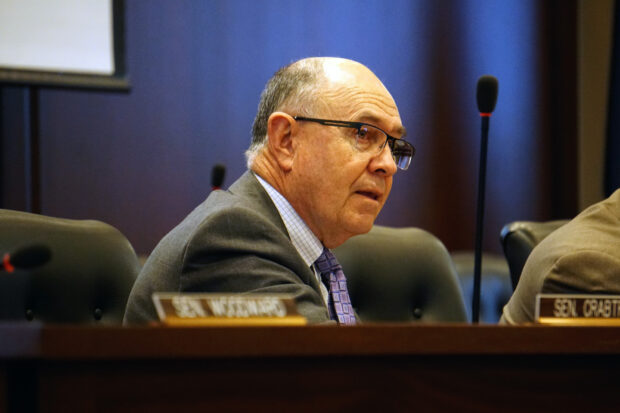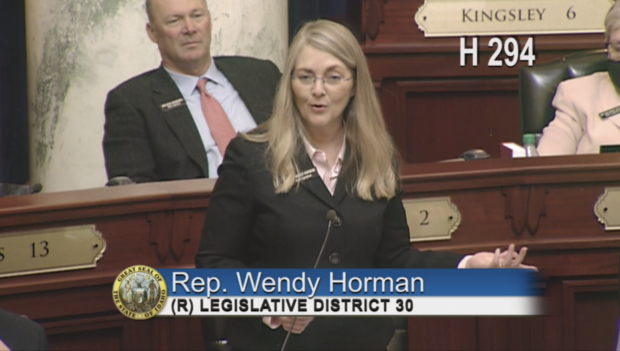When last we saw the Idaho Legislature in action, lawmakers hastily called an 18-day recess in an attempt to tamp down a Statehouse coronavirus outbreak.
Lawmakers hope to pick up where they left off Tuesday, when they meet for the first time since March 19.

“I don’t think the interruption or the recess is going to probably impact what does get done or what doesn’t get done,” said Senate President Pro Tem Chuck Winder, R-Boise, in a recent Idaho Education News podcast interview.
But, recess or no recess, this is still the legislative endgame, which means anything can happen. Some big bills will sneak through in the final days or hours of the session. Others will get waylaid or derailed.
The session will formally convene at noon Tuesday, with both the House and Senate scheduled to go back into session. What happens from there is unclear.
As of 7 a.m. Tuesday, only two legislative committee meetings are scheduled — and while most committee work is winding down, several committees are likely to take up some high-profile bills before the session wraps up. And both houses had plenty of unfinished business on March 19; more than 50 bills are on the House calendar for a potential vote, while the Senate has close to 70 bills on its calendar.
The education agenda
Education should be front and center in the session’s waning days:
- Both houses still must pass the public school budget bills. In recent years, the K-12 budget bills have passed the House and Senate with overwhelming bipartisan support.
- A higher education budget has passed the Senate — but it could face a tougher fight on the House floor. The House killed two versions of a higher ed budget in 2020, before finally passing a budget. This year’s House vote could be a defining moment for the Idaho Freedom Foundation, a conservative group that has railed against social justice programs on campus.
- Early education advocates will take another run at a bill authorizing the state to spend a three-year, $6 million federal grant. Last month, a sharply divided House killed the grant. A new bill — with tighter language on grant oversight and curriculum — represents an attempt to placate conservative opponents. “I do believe there will be the votes at the end of the day,” said Rep. Paul Amador, R-Coeur d’Alene, a bill sponsor. “But certainly we are doing our due diligence.”
- Supporters are making an 11th-hour attempt to pass a kindergarten bill, which would allow schools to use state dollars for expanded, full-day instruction. “That’s still in play, in my mind,” said Sen. Carl Crabtree, R-Grangeville, a sponsor. But there’s little margin for error, since the kindergarten still needs to pass both houses.
- A bill changing sex education from an “opt-out” class to an “opt-in” class has passed the House, but still has to get through the Senate. The bill was on the Senate Education Committee’s agenda for a hearing on March 22 — but that was before the recess.
- A bill to create family educational grants awaits a Senate vote; it’s on that long list of bills on the Senate calendar. The bill contains a controversial clause, which would allow parents to use the grants to cover private school costs. If the Senate passes this amended bill, the House would need to pass it a second time.
- Two guns-in-schools bills are parked in the Senate State Affairs Committee. One has already passed the House.
- The Powerball debate could resurface in the session’s final days. Last month, a House committee blocked the Idaho Lottery from continuing to participate in Powerball — a move that jeopardizes $14 million for schools and building projects.
So, what’s the timetable?
Of course, education isn’t the only item on the to-do list.
Gov. Brad Little and legislative leaders hope to agree on some form of tax relief — an overhaul that could affect education funding. Little also wants a transportation funding package. Lawmakers have spent much of the session noodling on bills asserting legislative authority during an emergency, but that work isn’t done yet. And now, weeks after Congress has passed its third and largest coronavirus stimulus law, lawmakers are looking for ways to have their say on where the money goes.
“We still have a lot of work to do,” Winder said last week. “I’m hopeful that we can be done by April 16. That’ll give us about 10 days.”
But like everything else at the end of a legislative session, timetables are unpredictable.

If lawmakers reject a budget bill — such as, for example, a higher education budget — that will slow down the process. If the House and the Senate struggle to find common ground on a tax bill — which is hardly unprecedented — that will delay things as well.
In other words, don’t be surprised if the session runs into late April.
“I think we have at least two weeks’ work when we get back, if not three,” said Rep. Wendy Horman, R-Idaho Falls.
Check in at Idaho Education News every day for up-to-the-minute legislative news.
